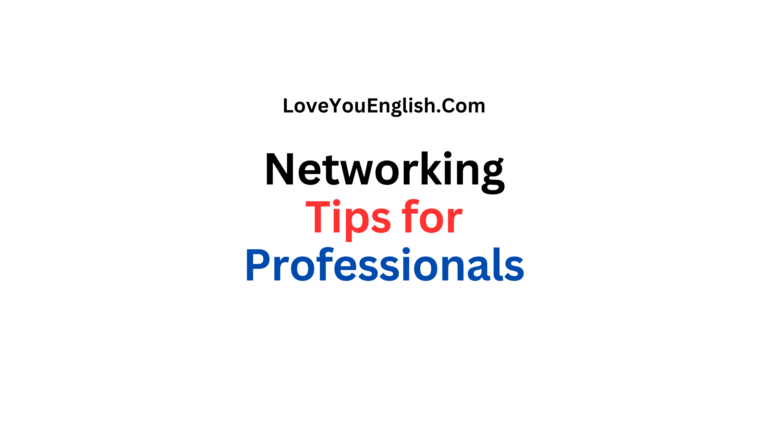Advice for Job Seekers: A Guide to the Job Search Process
Advice for Job Seekers: A Guide to the Job Search Process
Finding a job can be a challenging and stressful process, but with the right strategies and a positive mindset, you can increase your chances of landing a great position.
Here are some practical tips to help you navigate the job search process and secure the job you want.
Know What You Want
Before you start your job search, take some time to think about what kind of job you really want.
Consider your interests, skills, and values.
Ask yourself the following questions:
- What am I passionate about?
- What are my strengths?
- What kind of work environment do I thrive in?
- What are my long-term career goals?
Knowing what you want will help you focus your job search and target positions that are a good fit for you.
Update Your Resume
Your resume is often the first impression you make on a potential employer, so it’s important to make it as strong as possible.
Here are some tips for creating an effective resume:
- Keep it concise: Aim for one or two pages.
- Use a clear format: Use headings, bullet points, and consistent fonts.
- Highlight your achievements: Focus on your accomplishments rather than just listing job duties.
- Tailor it to the job: Customize your resume for each job you apply for by highlighting relevant experience and skills.
- Include keywords: Use keywords from the job description to help your resume get past automated applicant tracking systems (ATS).
Write a Strong Cover Letter
A cover letter is your chance to explain why you’re the best candidate for the job. It should complement your resume and provide additional information about your skills and experience.
Here are some tips for writing a compelling cover letter:
- Address it to a specific person: If possible, find out the name of the hiring manager.
- Start with a strong opening: Grab the reader’s attention with a compelling introduction.
- Show your enthusiasm: Explain why you’re excited about the job and the company.
- Highlight your fit: Explain how your skills and experience make you a good fit for the position.
- Keep it brief: Aim for one page or less.
Use Online Job Boards and Company Websites
There are many job boards and company websites where you can find job listings.
Some popular job boards include:
In addition to job boards, visit the websites of companies you’re interested in.
Many companies post job openings on their own websites, and applying directly through a company’s website can sometimes increase your chances of getting noticed.
Network
Networking is one of the most effective ways to find a job. Many job openings are never advertised, and networking can help you access these hidden opportunities.
Here are some tips for networking:
- Attend industry events: Go to conferences, workshops, and networking events related to your field.
- Join professional associations: Become a member of professional organizations related to your industry.
- Connect on LinkedIn: Use LinkedIn to connect with people in your industry and join relevant groups.
- Reach out to your contacts: Let your friends, family, and professional contacts know that you’re looking for a job.
Prepare for Interviews
Once you start getting interview invitations, it’s important to prepare thoroughly.
Here are some tips for preparing for job interviews:
- Research the company: Learn about the company’s history, mission, values, and products or services.
- Practice common interview questions: Prepare answers to common interview questions such as “Tell me about yourself” and “Why do you want to work here?”
- Prepare questions for the interviewer: Have a list of questions to ask the interviewer about the company and the position.
- Dress appropriately: Wear professional attire that’s appropriate for the company’s culture.
- Arrive on time: Aim to arrive 10-15 minutes early.
Follow Up
After an interview, it’s important to follow up with a thank-you note. This shows your appreciation for the opportunity and reinforces your interest in the position.
Here are some tips for following up:
- Send a thank-you email: Send a thank-you email within 24 hours of the interview.
- Express your gratitude: Thank the interviewer for their time and consideration.
- Reiterate your interest: Mention specific aspects of the job or company that you’re excited about.
- Keep it brief: A few short paragraphs are sufficient.
Stay Positive and Persistent
The job search process can be long and challenging, but it’s important to stay positive and persistent.
Here are some tips for staying motivated:
- Set goals: Set daily or weekly job search goals, such as applying to a certain number of jobs or reaching out to a certain number of contacts.
- Take breaks: Take regular breaks to rest and recharge.
- Stay organized: Keep track of the jobs you’ve applied for, the contacts you’ve made, and the interviews you’ve had.
- Seek support: Talk to friends, family, or a career counselor for support and advice.
Consider Temporary or Part-Time Work
If you’re having difficulty finding a full-time job, consider temporary or part-time work. Temporary or part-time positions can provide valuable experience, help you build your network, and potentially lead to full-time opportunities.
Here are some tips for finding temporary or part-time work:
- Look for temporary agencies: Many temporary agencies specialize in placing workers in temporary or part-time positions.
- Check job boards: Many job boards have sections for temporary or part-time jobs.
- Network: Let your contacts know that you’re open to temporary or part-time work.
Keep Learning and Growing
Continuing to learn and grow professionally can make you a more attractive candidate to potential employers.
Here are some ways to keep learning and growing:
- Take online courses: There are many online platforms that offer courses in a wide range of subjects, such as Coursera, Udemy, and LinkedIn Learning.
- Attend workshops and seminars: Look for workshops and seminars in your field.
- Read industry publications: Stay up-to-date with the latest trends and developments in your industry by reading industry publications.
- Join professional associations: Join professional associations related to your industry and participate in their events and activities.
Customize Your Job Applications
One of the keys to a successful job search is customizing your job applications for each position you apply for.
Here are some tips for customizing your job applications:
- Read the job description carefully: Pay close attention to the requirements and responsibilities of the job.
- Highlight relevant experience: Emphasize the experience and skills that are most relevant to the position.
- Use keywords: Use keywords from the job description in your resume and cover letter.
- Show your enthusiasm: Explain why you’re excited about the job and the company.
Practice Good Communication
Good communication is essential throughout the job search process.
Here are some tips for effective communication:
- Be professional: Use a professional tone in all your communications.
- Be clear and concise: Keep your messages clear and to the point.
- Follow instructions: Follow any instructions provided in the job posting or by the employer.
- Be responsive: Respond promptly to emails and phone calls from potential employers.
More professional topics:
- 50 Ways to Start a Conversation with Anyone
- Top Interview Tips for International Remote Jobs
- Effective Strategies to Improve Your Communication Skills
- 20 Essential Soft Skills for Students
- How to Concentrate on Studies | 10 Useful Methods
Use Social Media Wisely
Social media can be a powerful tool in your job search, but it’s important to use it wisely.
Here are some tips for using social media in your job search:
- Clean up your profiles: Make sure your social media profiles are professional and free of any inappropriate content.
- Use LinkedIn: Use LinkedIn to connect with people in your industry, join groups, and showcase your skills and experience.
- Follow companies: Follow companies you’re interested in on social media to stay updated on their news and job openings.
- Share relevant content: Share articles and updates related to your industry to demonstrate your knowledge and expertise.
Be Ready for Video Interviews
Video interviews have become increasingly common, so it’s important to be prepared for them.
Here are some tips for successful video interviews:
- Test your technology: Make sure your computer, camera, microphone, and internet connection are working properly.
- Choose a quiet location: Find a quiet, well-lit location for the interview.
- Dress professionally: Dress as you would for an in-person interview.
- Maintain good eye contact: Look at the camera, not the screen, to make eye contact with the interviewer.
- Minimize distractions: Make sure there are no distractions or interruptions during the interview.
Be Honest
Honesty is important throughout the job search process.
Here are some tips for being honest:
- Be truthful on your resume: Don’t exaggerate your experience or skills.
- Be honest in interviews: If you don’t know the answer to a question, it’s better to admit it than to make something up.
- Be upfront about gaps in your employment: If you have gaps in your employment history, explain them honestly.
Consider Different Industries
If you’re having difficulty finding a job in your current industry, consider exploring opportunities in other industries.
Here are some tips for transitioning to a different industry:
- Identify transferable skills: Consider how your skills and experience can be applied to other industries.
- Research the industry: Learn as much as you can about the new industry.
- Network: Connect with people in the new industry to learn about job opportunities and get advice.
Be Flexible
Flexibility can increase your chances of finding a job.
Here are some tips for being flexible:
Build a Strong Online Presence
In today’s digital age, having a strong online presence can greatly enhance your job search.
Here’s how to build and maintain an effective online presence:
- Create a professional LinkedIn profile: Make sure your LinkedIn profile is complete, including a professional photo, a compelling headline, and a detailed summary of your skills and experience.
- Showcase your work: If applicable, create an online portfolio to showcase your work and achievements. This is especially important for creative fields.
- Engage in industry discussions: Participate in discussions and share relevant content on professional forums and social media platforms.
- Stay active: Regularly update your online profiles and engage with your network to keep your presence active.
Use Job Alerts
Job alerts can help you stay updated on new job opportunities without having to constantly check job boards.
Here’s how to set up effective job alerts:
- Set specific criteria: Define the job titles, locations, and industries you’re interested in.
- Use multiple platforms: Set up alerts on various job boards and company websites.
- Check your email regularly: Ensure you check your email frequently so you don’t miss out on new job alerts.
Practice Self-Care
Job searching can be stressful, so it’s important to take care of yourself during the process.
Here are some self-care tips:
- Take regular breaks: Step away from your job search to relax and recharge.
- Exercise: Regular physical activity can help reduce stress and improve your mood.
- Eat well: Maintain a healthy diet to keep your energy levels up.
- Seek support: Talk to friends, family, or a therapist if you’re feeling overwhelmed or stressed.
Prepare for Salary Negotiations
Once you receive a job offer, you may have the opportunity to negotiate your salary.
Here are some tips for negotiating effectively:
- Do your research: Research typical salaries for the position and industry to understand what’s reasonable.
- Know your worth: Be ready to explain why you deserve a higher salary based on your skills, experience, and qualifications.
- Be professional: Approach the negotiation with a positive and professional attitude.
- Consider the whole package: Remember to consider benefits, bonuses, and other perks in addition to salary.
Stay Informed About Industry Trends
Being knowledgeable about current trends in your industry can make you a more attractive candidate.
Here’s how to stay informed:
- Read industry blogs and news: Regularly read blogs, news articles, and reports related to your field.
- Attend webinars and workshops: Participate in webinars and workshops to learn about new developments and best practices.
- Join professional groups: Become a member of industry groups and associations to stay connected and informed.
Be Prepared for Rejection
Rejection is a natural part of the job search process, but it can be disheartening.
Here’s how to handle rejection gracefully:
- Don’t take it personally: Understand that rejection often reflects a fit issue rather than your abilities.
- Seek feedback: If possible, ask for feedback from the interviewer to learn and improve.
- Keep moving forward: Use rejection as an opportunity to reassess and adjust your job search strategies if needed.
Develop Soft Skills
Soft skills, such as communication, teamwork, and problem-solving, are highly valued by employers.
Here’s how to develop and showcase these skills:
- Take courses: Enroll in courses or workshops that focus on soft skills development.
- Practice in real-life situations: Look for opportunities to practice these skills in your daily life or through volunteer work.
- Highlight them in your applications: Use examples of your soft skills in your resume and cover letter to demonstrate your qualifications.
Seek Professional Help if Needed
If you’re struggling with your job search or need additional guidance, consider seeking professional help:
- Career counselors: Career counselors can provide personalized advice, help you with resume writing, and offer job search strategies.
- Recruitment agencies: Recruitment agencies can connect you with job opportunities and provide support throughout the application process.
- Mentors: Finding a mentor in your field can offer valuable insights and advice on navigating your career path.
Conclusion
Good luck finding a job! It might be tough, but if you stay focused and follow these tips, you can increase your chances of success.
Make sure you know what you want, update your resume and cover letter, try different job search strategies, and keep a positive attitude.
Keep at it and you’ll be on your way to getting the job you’re after.







